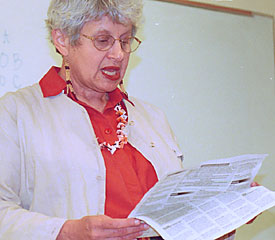 |
|
DANIELLE MALOTT/Arizona Daily Wildcat
|
Humanities professor Bella Vivante announces upcoming events to her Storytelling in Contemporary Literature class last month.
|
|
By Debra Hollander
Arizona Daily Wildcat
Thursday April 17, 2003
Bella Vivante's students have spent some time in the dark.
But she only turns the lights out so that her students can get a better picture of ancient art.
Vivante, who has been teaching at UA for 16 years, often uses picture slides in her Oral and Spiritual Roots of Traditional Cultures (TRAD 104) class so that her students can actually have the chance to see what she is teaching.
Vivante, a professor of humanities, has recently been selected by the University-Wide General Education Committee as an outstanding faculty member for her learner-centered teaching.
Vivante's class takes an in-depth look at ancient Mesopotamian, Greek and American Indian stories about creation, heroes, gods and goddesses and art.
"We study all three together because they are, all three, important in shaping aspects of modern American society," Vivante said, citing examples such as Greek ideas about law and politics, the American Indians' influence on women's rights and wildlife management, as well as the Mesopotamian influence on the Bible.
"In today's multicultural world, thanks to these stories and tales, students can learn about other cultures of past, and hopefully find some similarities with today's world," said Marcin Aleturowicz, a grader for Vivante's class.
Vivante's students come from an array of cultures and backgrounds, all of which bring varying views and discussion topics to her classes.
"I was brought up in the Catholic Church, and it's really cool to be able to learn different views of creation," said Angela Christl, an undeclared freshman in Vivante's TRAD course.
It is through many of these discussions that some students believe they really grasp the information Vivante presents.
"In-class discussions really help the understanding and comprehension of the readings," said Scott Kelley, a business freshman.
Kelley said the art slides are his favorite part of the class.
Vivante attributes much of her success in the classroom to class size. Her classes usually have about 50 students, who are divided into smaller discussion groups.
"Humanities classes tend to be smaller. A lot of the class is dependent on direct student participation which makes the class more interesting," she said. "The important thing that I try to impress upon students is the ability to think about something critically."
Vivante received her bachelor's degree in comparative literature at Columbia University and her doctorate in classics and humanities at Stanford.
Vivante is currently planning the fourth Feminism and Classics Conference at UA, which will take place in May 2004. It is titled "Gender and Diversity in Place."

